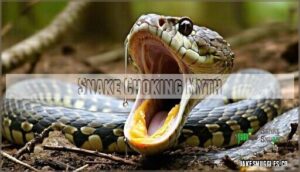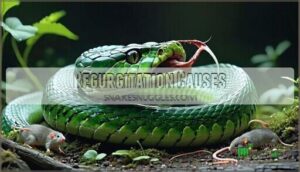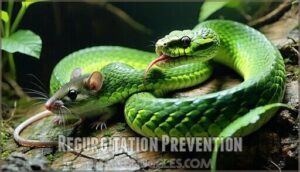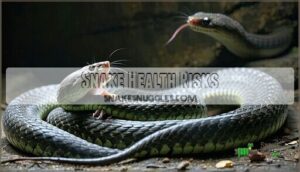This site is supported by our readers. We may earn a commission, at no cost to you, if you purchase through links.
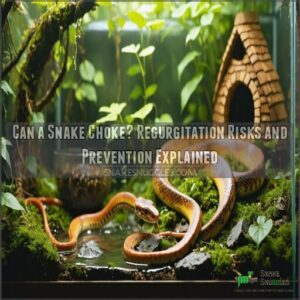
However, they can regurgitate food if stressed, handled too soon after eating, or kept in poor conditions like improper temperatures or humidity.
Overfeeding or giving prey that’s too large can even cause their stomach to burst—a serious, often fatal condition.
To prevent these risks, make certain your snake’s enclosure is clean, maintain the proper temperature gradient, and feed them appropriately sized prey.
Curious about avoiding health scares? It’s easier than you think with the right care practices to ensure your snake stays healthy, and following these guidelines can help prevent a serious condition.
Table Of Contents
- Key Takeaways
- Snake Choking Myth
- Can Snakes Choke
- Regurgitation Causes
- Regurgitation Prevention
- Snake Health Risks
- Frequently Asked Questions (FAQs)
- Can a snake choke while eating?
- What to do after snake regurgitates?
- What happens if a snake regurgitates?
- Can snakes choke while eating?
- Can I handle my snake after regurgitation?
- How long to wait to feed a snake after regurgitation?
- How long can a snake survive without eating again?
- Can snakes regurgitate their meal without any warning signs?
- What are the common signs of a stressed snake?
- How often should a snake be fed to prevent regurgitation?
- Conclusion
Key Takeaways
- Snakes can’t choke while eating because their glottis lets them breathe even when swallowing large prey.
- Stress, improper handling, or incorrect enclosure conditions can cause regurgitation, which is preventable with proper care.
- Overfeeding or feeding prey that’s too large can lead to stomach bursting, a fatal condition, so always size prey appropriately.
- Maintain the right temperature and humidity, clean the enclosure regularly, and avoid handling your snake right after feeding to ensure its health.
Snake Choking Myth
You might think a snake could choke while eating, but their anatomy prevents it.
Thanks to their glottis, snakes can breathe even with a mouth full of prey, ensuring they avoid this risk entirely.
With their snorkel-like glottis, snakes masterfully breathe while devouring prey, effortlessly avoiding the risk of choking.
Anatomy of Snake Glottis
A snake’s glottis serves as a key anatomical structure, opening into the trachea to guarantee continuous breathing.
This breathing mechanism is an evolutionary advantage, allowing snakes to inhale even while eating. Positioned just behind the tongue, the glottis functions like a snorkel, moving forward to keep the airway clear.
This design prevents choking, highlighting snake anatomy and physiology’s incredible adaptation for survival, digestion, and choking prevention within their unique digestive system.
Regurgitation can occur due to digestive or husbandry problems.
Snakes’ Ability to Breathe While Eating
Thanks to their Glottis Function, snakes have an amazing Breathing Mechanism that keeps them going while they eat.
Their snake physiology includes a "snorkel-like" glottis, ensuring airways stay clear even with a full mouth.
- Prey Consumption won’t block breathing due to this clever system.
- Anatomical Adaptations make choking nearly impossible.
- The snake respiratory system works seamlessly under pressure.
- Glottis moves forward during meals.
- Choking Prevention comes naturally through this setup.
No Documented Cases of Choking
There’s no documented evidence of snake choking.
Thanks to their glottis function, snakes breathe effortlessly while swallowing.
This breathing adaptation allows airflow even when their mouths are full, and flexible jaws and precise swallowing mechanisms guarantee prey size doesn’t obstruct their airways.
Snake physiology is built to handle large meals without choking, regurgitation, or bursting, instead, snake digestion focuses on efficiency, leaving choking myths as fascinating misconceptions of nature’s design.
Can Snakes Choke
Surprisingly, snakes can’t choke thanks to their glottis function. This nifty breathing mechanism acts like a snorkel, letting them breathe while tackling large meals.
Flexible jaws and unique swallowing adaptations prevent choking incidents entirely. While stories about snake choking or snake bursting may surface, they’re myths, not grounded in snake health facts.
Their anatomy is built for devouring meals much wider than their heads. If you’ve worried about snake regurgitation, rest assured choking has no role—it’s another digestive tale entirely.
If regurgitation occurs, it may indicate digestive or husbandry problems, which can be related to snake health facts and husbandry problems.
Regurgitation Causes
Regurgitation in snakes happens when they expel food before digestion begins, often due to stress, improper handling, or feeding mistakes.
Regurgitation occurs when stress or feeding mistakes disrupt digestion, emphasizing the importance of proper care and handling for healthy snakes.
Factors like incorrect temperatures, prey size, or overfeeding are common triggers that disrupt their digestion process.
Stress and Handling Issues
Handling stress plays a big role in snake regurgitation. Minimizing interaction after feeding is critical.
Here’s how to reduce Post-Feeding Stress:
- Limit Handling Frequency, especially within 48 hours of feeding.
- Provide Hide Availability to make your snake feel secure.
- Avoid unnecessary Transport Stress right after meals.
- Stay mindful of your snake’s behavior to prioritize their health and comfort.
Incorrect Temperature and Humidity
Incorrect temperature and humidity disrupt a snake’s digestion, leading to reptile regurgitation.
A proper temperature gradient—78°F on the cool side and 88-89°F on the warm side—promotes thermoregulation, preventing regurgitation.
Low temperatures cause food to rot, while high heat stresses the snake.
Similarly, improper humidity levels can cause shedding problems or respiratory infections, amplifying husbandry errors and snake regurgitation causes, which are critical to prevent through proper reptile regurgitation management.
Improper Feeding Practices
Feeding mistakes often lead to snake regurgitation.
Follow these simple guidelines:
- Prey Size: Always choose prey smaller than the snake’s widest body part.
- Feeding Frequency: Avoid overfeeding; space meals appropriately.
- Frozen Thawing: Fully thaw frozen prey to prevent digestion issues.
- Food Hygiene: Keep prey clean and never reuse uneaten items.
Proper feeding reduces regurgitation risks substantially.
Prey Size and Overfeeding
Choosing the right prey size is essential for your snake’s diet.
Prey should match your snake’s girth to avoid digestive stress or regurgitation.
Overfeeding poses obesity risks and can overwhelm digestion.
Stick to a suitable feeding frequency for health.
| Feeding Tips | Why It Matters |
|---|---|
| Match prey size | Prevents digestive stress |
| Avoid overfeeding | Reduces obesity risks |
| Monitor prey weight | Guarantees proper nutrition |
| Feed less frequently | Aids digestion stability |
| Observe snake behavior | Identifies feeding issues |
Regurgitation Prevention
To prevent regurgitation in snakes, you need to focus on proper husbandry practices like maintaining an ideal temperature gradient and feeding appropriately sized prey.
Avoid handling your snake after meals, and always keep its enclosure clean to reduce stress and support digestion.
Proper Temperature Gradient
Maintaining a proper temperature gradient is vital for preventing regurgitation and supporting digestion.
Use heating placement wisely, aligning with your snake’s species needs.
Thermostat control guarantees consistent temperatures, while gradient monitoring allows basking behavior for digestion.
Without the right warmth, snakes may face digestive problems, including regurgitation.
A balanced environment prevents issues and promotes healthy feeding, not reptile choking concerns.
Consistent temperatures are achievable with reptile thermostat control, ensuring a proper environment for reptile care and preventing regurgitation.
Avoiding Handling After Feeding
After feeding, give your snake some quiet time to rest. Handling too soon can lead to digestion disruption or regurgitation.
Safe handling means waiting at least 48 hours post-meal. This post-meal care helps with stress reduction and prevents snake digestive problems.
Respecting their space guarantees better snake health, making it a simple yet essential step in snake care, which ultimately contributes to better snake health.
Monitoring Prey Size and Quality
Not all meals are created equal—prey size matters for your snake’s health.
Oversized prey can cause snake digestive problems and stress.
Follow these snake feeding guidelines for smoother digestion:
- Size Check: Prey should be no wider than your snake’s body.
- Frozen vs. Live: Use frozen-thawed rodents to avoid injuries.
- Safe Thawing: Properly thaw frozen prey to preserve nutritional value.
Maintaining stable temperatures can help prevent environmental stress factors.
Maintaining Clean Enclosures
Keeping your snake’s enclosure clean is critical for preventing regurgitation and health issues.
Remove waste promptly, use safe disinfecting methods, and replace soiled substrates regularly.
Clean water helps guarantee good hydration and digestion.
Regularly sanitize enrichment items to minimize bacteria, and proper husbandry supports a healthy snake diet and also reduces risks like vomiting, especially after feeding snake prey.
To maintain a hygienic environment, consider using a reptile-safe enclosure cleaner, which is essential for a healthy snake.
Snake Health Risks
Snakes face several health risks, including regurgitation, vomiting, and infections, that can lead to serious complications if not addressed promptly.
Understanding these risks helps you prevent common issues and safeguard your snake’s well-being.
Consequences of Regurgitation and Vomiting
Regurgitation and vomiting upset a snake’s health balance. Dehydration risk goes up, and malnutrition effects weaken them.
Digestive damage leads to ongoing digestive issues and increased infection susceptibility. Over time, these snake health issues can cause long-term health setbacks.
Repeated episodes, especially regurgitation cycles, strain organs and worsen snake diseases. Understanding environmental stress factors is essential for prevention.
Quick resolution helps prevent irreversible damage or fatal complications.
Identifying Health Risks and Diseases
Snakes can suffer from serious diseases if health risks go unnoticed. Watch for infection symptoms, like vomiting or loss of appetite. Early parasite detection helps prevent complications.
Genetic predispositions may lead to disorders like organ failure or tumors. Here’s how to act:
- Monitor for unusual behavior.
- Check for obstructions or weight changes.
- Address snake vomiting quickly.
- Seek reptile health expertise to ensure the best care for your snake, especially in cases of organ failure.
Preventing Parasites and Infections
Parasites love chaos, so start with hygiene practices and consistent snake health management.
Quarantine protocols stop parasite infections from spreading between snakes.
Use probiotics to boost digestive health.
Captive breeding lessens exposure to wild parasites.
Regular veterinary exams catch reptile health issues early.
| Strategy | Purpose | Action | Result |
|---|---|---|---|
| Quarantine Protocols | Prevent spread | Separate new snakes | Healthier environment |
| Hygiene Practices | Reduce contamination | Clean habitats weekly | Lower parasite risk |
| Probiotic Use | Aid digestion | Add to diet | Improved gut health |
| Captive Breeding | Minimize parasite exposure | Buy captive-bred | Stronger snake health |
Reorganizing the structure improves readability by logically grouping complete concepts into separate lines, with double new lines to visually separate each group, and quarantine protocols are essential for a healthier environment.
The use of captive breeding minimizes parasite exposure, leading to stronger snake health.
Importance of Regular Veterinary Check-Ups
Regular veterinary care is essential for your snake’s health.
Early detection of reptile health issues, like parasites or infections, can prevent emergencies.
Annual check-ups guarantee proper health monitoring and offer husbandry advice.
Preventative care, including parasite screening, helps avoid snake vomiting treatment later.
Understanding the reptile vet costs can help owners budget for their snake’s healthcare.
A knowledgeable snake vet can catch issues early, safeguarding against complications and supporting a happy, healthy pet.
Frequently Asked Questions (FAQs)
Can a snake choke while eating?
Think of a straw with lungs attached—thanks to a special structure called the glottis, snakes can breathe while eating.
They can’t choke, but improper prey size or stress might cause regurgitation instead.
What to do after snake regurgitates?
After your snake regurgitates, clean its enclosure thoroughly, avoid feeding it for 14 days, and make certain proper temperatures.
Minimize handling to reduce stress, provide fresh water, and evaluate potential causes like prey size or environment.
What happens if a snake regurgitates?
When a snake regurgitates, its digestion delays, stressing its system.
Clean the enclosure, let it rest for 14 days, and check husbandry conditions like temperature and feeding practices to prevent further regurgitation and guarantee recovery.
Can snakes choke while eating?
Snakes can’t choke while eating because their glottis acts like a snorkel, letting them breathe even with a full mouth.
This nifty adaptation guarantees they handle giant meals without suffocating or skipping a breath.
Can I handle my snake after regurgitation?
You shouldn’t handle your snake after regurgitation.
Give it 14 days to recover and prevent stress.
Handling too soon can disrupt its digestion, making matters worse.
Let it heal in peace for ideal health.
How long to wait to feed a snake after regurgitation?
Wait at least 14 days before feeding your snake again after regurgitation.
This allows its digestive system to recover fully.
Rushing this process can lead to more issues, so patience is key for proper care.
How long can a snake survive without eating again?
Depending on its health and species, a snake can go weeks to months without eating, sometimes up to six months.
Healthy adults store energy efficiently and can easily cope with extended fasting periods.
Can snakes regurgitate their meal without any warning signs?
Yes, without clear warning signs, a snake might regurgitate its meal if it’s stressed, handled too soon after eating, or exposed to incorrect temperatures.
Monitor conditions closely to prevent this sudden, unsettling reaction. Monitor conditions closely to prevent this sudden, unsettling reaction.
What are the common signs of a stressed snake?
Signs of a stressed snake include hiding excessively, refusing food, hissing, striking, or frequent shedding issues.
You might also notice erratic movements, frequent yawning, or rubbing against objects.
Watch for changes in usual behavior, especially those that indicate stress, such as hissing or striking, to ensure the snake’s well-being.
How often should a snake be fed to prevent regurgitation?
Feeding a snake too often is like overfilling a gas tank—it spills out.
Feed it every 5-14 days, depending on size, to prevent regurgitation.
Larger snakes need less frequent meals; smaller ones need more.
Conclusion
Surprisingly, while snakes can’t choke due to their unique glottis, other serious risks like regurgitation and stomach bursting demand your attention.
Stress, improper enclosure conditions, and feeding mistakes often trigger these issues, putting your snake’s health at risk.
To protect them, maintain a clean habitat, guarantee the right temperature and humidity, and offer appropriately sized prey.
With proper care, preventing regurgitation and bursting is straightforward, guaranteeing your snake thrives without unnecessary health scares, and your efforts truly matter.

